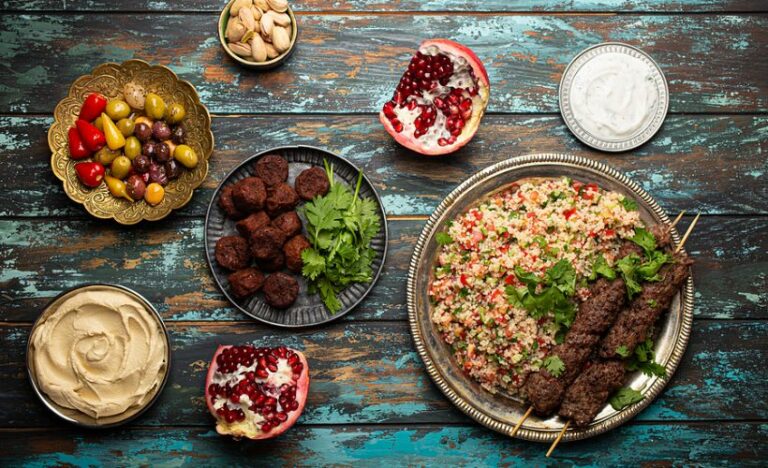Introduction to Lebanese cuisine
Lebanese cuisine is a rich and diverse blend of Mediterranean and Middle Eastern flavors resulting from the influences of various cultures over the centuries. Lebanese cuisine is characterized by its use of fresh herbs, spices, and vegetables, as well as its preparation of meats and grains.
Lebanese cuisine is generally considered healthy due to its emphasis on fresh, whole foods and its limited use of processed ingredients. It is also known for its generous use of olive oil, which is high in monounsaturated fats and has been linked to lower rates of heart disease.
Common ingredients in Lebanese cuisine
Some of the most common ingredients in Lebanese cuisine include chickpeas, lentils, bulgur, eggplant, spinach, parsley, mint, and sumac. These ingredients are used in a variety of dishes such as tabbouleh, hummus, and baba ghanoush.
Meat is also a significant part of Lebanese cuisine, with lamb, chicken, and beef commonly used in dishes such as shawarma and kibbeh. Seafood is another popular ingredient, with fish and squid used in dishes such as samak bi tahini and calamari.
Dietary restrictions for vegetarians
Lebanese cuisine is generally vegetarian-friendly, with many dishes containing lentils, chickpeas, and vegetables. However, some dishes may contain meat or meat-based broths, so it is important to check with the chef or server before ordering.
One dish that is particularly popular among vegetarians is mujadara, a lentil and rice dish topped with caramelized onions. Another popular vegetarian dish is fattoush, a salad made with fresh vegetables and pita bread.
Considerations for individuals with gluten intolerance
Many Lebanese dishes contain wheat-based ingredients such as bulgur and pita bread, which can be problematic for individuals with gluten intolerance or celiac disease. However, there are also many Lebanese dishes that are naturally gluten-free, such as tabbouleh and fattoush.
For individuals with gluten intolerance, it is important to check with the chef or server before ordering and to ask if gluten-free options are available.
Popular Lebanese dishes suitable for vegan diets
Lebanese cuisine is known for its many vegan-friendly dishes, such as hummus, baba ghanoush, and falafel. These dishes are traditionally made without any animal products and are therefore safe for vegans to consume.
Other popular vegan dishes include mujadara, a lentil and rice dish, and maqluba, a vegetable and rice casserole. These dishes are often served with fresh vegetables and a side of pita bread.
Health benefits of Lebanese cuisine
Lebanese cuisine is generally considered healthy due to its emphasis on fresh, whole foods and its limited use of processed ingredients. Many Lebanese dishes are also high in fiber, which can help reduce cholesterol levels and improve digestive health.
In addition, Lebanese cuisine is rich in antioxidants, which can help protect against chronic diseases such as heart disease, cancer, and Alzheimer’s disease. The generous use of olive oil in Lebanese cuisine is also beneficial, as it has been linked to lower rates of heart disease and improved brain function.
Overall, Lebanese cuisine is a delicious and healthy option for individuals looking to incorporate more plant-based foods into their diet.

